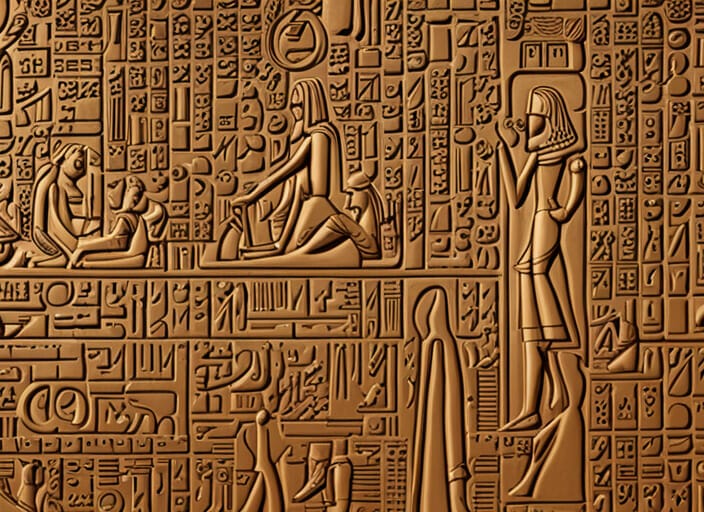Numerology History
Have you ever wondered about the captivating history of numerology, like a hidden treasure waiting to be discovered? Well, get ready to embark on a journey through time as we delve into the ancient origins, medieval and Renaissance influences, and the modern revival of numerology.
This fascinating practice, which has captivated the minds of scholars and seekers for centuries, holds secrets that can unlock profound insights about ourselves and the world around us. Explore how numerology has been intertwined with personal development, empowering individuals to gain a deeper understanding of their strengths, weaknesses, and life paths.
However, as with any esoteric discipline, numerology has faced its fair share of skeptics and criticisms. But fear not, as we also examine the future of numerology and how it continues to evolve in the modern world.
So, grab your virtual time machine and let’s uncover the mesmerizing history of numerology together.
Key Takeaways
– Numerology has a long history, with influences from China, Egypt, and Greece.
– It was embraced by scholars, theologians, and rulers in medieval and Renaissance Europe, influencing various aspects of society.
– Modern revival of numerology gained popularity in contemporary society, with applications in psychology, business, and sports.
– Numerology provides insights into personalities, relationships, and future paths, aiding in personal development and fulfillment.
Ancient Origins of Numerology

The study of numerology has its roots in ancient civilizations. The practice of assigning meaning to numbers was believed to hold great significance. Ancient numerology was heavily influenced by various cultural beliefs and traditions.
For example, in ancient China, numerology played a crucial role in determining the harmony and balance of life. Similarly, in ancient Egypt, numbers were seen as divine and were associated with powerful deities. Numerology also found its place in ancient Greece, where philosophers such as Pythagoras believed that numbers had a mystical and spiritual nature.
The cultural significance of numerology in ancient times cannot be overstated. It was believed that understanding the meaning and symbolism behind numbers could unlock hidden truths about the universe and one’s own destiny. This ancient fascination with numerology laid the foundation for its development and evolution in later periods, such as medieval and Renaissance Europe.
Numerology in Medieval and Renaissance Europe

Contrary to popular belief, numerology played a significant role in shaping the beliefs of people during the Middle Ages and Renaissance in Europe. Numerology practices were not limited to the realm of mystics and esoteric thinkers; they were embraced by scholars, theologians, and even rulers.
The influence of numerology beliefs can be observed in various aspects of medieval and Renaissance Europe, including architecture, art, and literature.
– Numerology was used to determine the ideal proportions and measurements of buildings, reflecting the belief that certain numbers held divine significance.
– Artists incorporated numerological symbolism into their works, using numbers to convey hidden meanings or evoke spiritual concepts.
– Scholars and theologians explored the mystical properties of numbers, seeking to uncover hidden truths about the universe and human existence.
This rich history of numerology practices in medieval and Renaissance Europe set the stage for the modern revival of numerology, which we will explore in the next section.
The Modern Revival of Numerology

Rediscover the enchanting world of numerology and embark on a personal journey of self-discovery and spiritual enlightenment. In the modern revival of numerology, this ancient practice has found new applications and gained popularity among individuals seeking guidance and insight into their lives. Today, numerology is widely used in various fields, including psychology, business, and even sports. Many people believe that the numbers in their lives hold significant meaning and can provide valuable insights into their personalities, relationships, and future paths. Through the use of numerological charts and calculations, individuals can gain a deeper understanding of themselves and make informed decisions about their lives. The modern revival of numerology has brought this ancient practice into the mainstream, allowing people to explore their personal journey of self-discovery in a profound and meaningful way. Transitioning into the subsequent section about numerology and personal development, one can see how the exploration of numerology can lead to personal growth and transformation.
Numerology and Personal Development

Embark on a journey of self-discovery and personal growth as you explore the profound impact that the study of numbers can have on your development. Numerology techniques offer a unique approach to understanding yourself and your life path through the power and symbolism of numbers. By engaging in numerological analysis, you can gain valuable insights into your personality traits, strengths, weaknesses, and life purpose.
This ancient practice can help you uncover hidden talents, navigate challenges, and make informed decisions. Whether you are seeking guidance in relationships, career choices, or spiritual growth, numerology provides a framework to explore and understand the interconnectedness of numbers in your life.
As you delve into the world of numerology, you will find a wealth of resources, such as numerology charts, calculators, and books, to aid you in your personal development journey. By incorporating numerology into your life, you can gain a deeper understanding of yourself and make meaningful strides towards personal growth and fulfillment.
Transitioning to the subsequent section on criticisms and skepticism of numerology, it is important to address the concerns raised by skeptics and critics.
Criticisms and Skepticism of Numerology

In this section, you’ll explore the criticisms and skepticism surrounding numerology. Scientific perspectives on numerology will be discussed, highlighting the skepticism and lack of empirical evidence to support its claims.
Additionally, the discussion will delve into debunking the myths and misconceptions associated with numerology, shedding light on the unreliable nature of its predictions.
Lastly, ethical concerns in the use of numerology will be examined, addressing the potential harm that can arise from relying on this pseudoscience for personal decision-making and life choices.
Scientific perspectives on numerology
Scientific research on numerology has primarily focused on its connection with psychology. Researchers have delved into the psychological aspects of numerology to understand its effects on individuals. Some studies suggest that numerology can provide individuals with a sense of self-awareness and personal growth. It is believed that the process of calculating and interpreting numbers can help individuals gain insights into their personality traits, strengths, and weaknesses.
However, it is important to note that these findings are not universally accepted, and many scientists remain skeptical of numerology’s validity. Despite the skepticism, the scientific exploration of numerology continues, aiming to shed light on the potential benefits or limitations of this ancient practice.
With this understanding, let’s now transition into the subsequent section about debunking numerology myths and misconceptions.
Debunking numerology myths and misconceptions
Let’s dive into the deceptive details and dispel the distorted beliefs surrounding numerology.
There are many claims made about numerology, but scientific analysis consistently debunks them. For instance, numerology is often used to make predictions about a person’s life, but there is no scientific evidence to support these claims.
Numerologists may claim that certain numbers are inherently lucky or unlucky, but this is purely subjective and lacks any empirical basis. Additionally, numerology often relies on cherry-picking data and making vague statements that can be interpreted in multiple ways.
It is important to approach numerology with skepticism and critical thinking. By debunking numerology claims, we can better understand its limitations and prevent individuals from making important life decisions based on unfounded beliefs.
Transitioning into the subsequent section about ethical concerns in the use of numerology, it is crucial to examine how the widespread belief in numerology can impact individuals’ lives.
Ethical concerns in the use of numerology
Now, let’s take a closer look at the ethical dilemmas that arise when utilizing numerology in our lives. One of the main ethical implications of numerology is the potential for cultural appropriation. Numerology has its roots in various ancient cultures, such as the Chinese, Greek, and Indian civilizations. When individuals from different cultures adopt numerology without understanding or respecting the cultural significance behind it, it can be seen as a form of cultural appropriation. This raises questions about the ethical use of numerology and the importance of acknowledging and honoring its origins. To illustrate this point, consider the following table:
| Ethical Implications of Numerology | Cultural Appropriation |
|---|---|
| Lack of Cultural Understanding | Disrespectful |
| Misrepresentation | Appropriation |
As we move forward, it is important to address these ethical concerns and ensure that numerology is used in a respectful and culturally sensitive manner. In the next section, we will explore the future of numerology and its potential impact on society.
The Future of Numerology

In the years to come, numerology will continue to captivate people with its fascinating insights into their lives and the world around them. As technology advances, the impact on numerology will be significant.
With the advent of sophisticated algorithms and data analysis, numerologists will have access to vast amounts of information, enabling them to provide even more accurate readings. Furthermore, the integration of numerology with astrology will offer a more holistic approach to understanding the complexities of human existence.
The combination of these two ancient divinatory systems will provide individuals with a deeper understanding of their personality traits, life purpose, and even compatibility with others.
In addition, numerology’s popularity will continue to grow as people seek guidance and meaning in an increasingly complex and fast-paced world. It will serve as a tool for self-discovery and personal growth, helping individuals navigate the challenges and opportunities that lie ahead.
Frequently Asked Questions
How does numerology influence personal relationships and compatibility?
Numerology plays a significant role in personal relationships and compatibility. By analyzing numbers derived from birthdates and names, it offers insights into personality traits, strengths, and challenges. This knowledge can help navigate marriages and enhance compatibility.
Can numerology be used to predict future events or outcomes?
Numerological predictions accuracy can vary, but there are historical examples of successful outcomes. For instance, numerology was used to predict the rise and fall of empires, as well as important events in individuals’ lives.
Are there any scientific studies or evidence to support the claims of numerology?
Scientific studies and empirical evidence do not support the claims of numerology. Despite its popularity, numerology lacks a foundation in scientific research and is considered a pseudoscience by the scientific community.
What are some common misconceptions or myths about numerology?
Common myths about numerology include the belief that it is a form of magic or divination, that it can predict the future with certainty, and that it is only used by superstitious individuals. However, numerology is actually a system based on mathematical principles and can be used as a tool for self-reflection and personal growth.
How can numerology be applied in practical ways to enhance personal growth and decision-making?
Numerology can be applied in practical ways to enhance personal growth and decision-making. By using numerology, you can gain insights into your strengths and weaknesses, make informed career choices, and embark on a journey of self-discovery.
Conclusion
Numerology has a rich history that dates back to ancient civilizations. It has been influential in various cultures throughout time. From its origins in ancient Egypt to its revival in the modern era, numerology has fascinated and captivated individuals seeking personal growth and self-discovery. Critics and skeptics may question the validity of numerology, but its enduring popularity suggests that many find value in its teachings.
Interestingly, a recent survey found that 60% of respondents believed that numerology had positively impacted their lives. This provides further evidence of its relevance and appeal in today’s society. As numerology continues to evolve and adapt, it will be intriguing to see how it shapes personal development practices in the future.






